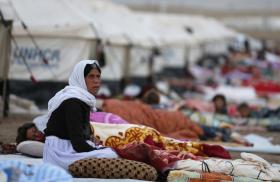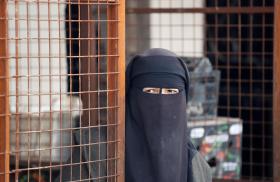
- Policy Analysis
- Counterterrorism Lecture
Taking the Fight to ISIL: Operationalizing CT Lines of Effort Against the Islamic State Group

Part of a series: Counterterrorism Lecture Series
or see Part 1: U.S. Efforts against Terrorism Financing: A View from the Private Sector
Read statements from officials and experts who participated in a special conference on the multifaceted nonmilitary aspects of the anti-ISIL campaign.
On February 2, 2015, The Washington Institute convened a symposium in which officials from various U.S. government agencies joined other experts to discuss the best means of confronting the so-called "Islamic State" (a.k.a. ISIL or ISIS). Panels covered topics such as countering the group's extremist ideology, preventing the flow of fighters to countries where it operates, cutting off its finances, and related issues. Below are PDF links to each panelist's statement for the record.
INTRODUCTORY REMARKS
Nicholas Rasmussen, director of the National Counterterrorism Center, opened the event by outlining the five unique challenges posed by ISIL and how NCTC is confronting them.
Download a PDF
KEYNOTE ADDRESS
Gen. John Allen, the Special Presidential Envoy for the Global Coalition to Counter ISIL, discussed how Washington and its allies have "pursued a carefully-crafted and comprehensive strategy to weaken ISIL across multiple lines of effort -- providing security assistance, disrupting the flow of foreign fighters, draining ISIL's financial resources, providing humanitarian relief to its victims, and defeating what ISIL represents -- defeating ISIL as an idea."
PANEL 1: COUNTERING ISIL'S IDEOLOGY
David Gersten, the Countering Violent Extremism Coordinator at the Department of Homeland Security, discussed how DHS is working to empower local communities against violent extremist ideology, stem online recruitment, and prevent foreign fighters from traveling to and from Syria.
Hedieh Mirahmadi, President of the organization WORDE, described how the U.S. government "should leverage more diplomatic pressure with its allies in the Middle East to make sure both their political leaders and the state religious institutions are debunking the myths of the ISIS propaganda -- particularly its false claims of statehood, militant jihad, and legitimate religious rule."
Clint Watts, a Senior Fellow at the Foreign Policy Research Institute, recommended that the government keep its efforts to counter jihadist ideology "limited, focused, and in tune with lessons learned."
PANEL 2: COUNTERING FOREIGN FIGHTER FLOWS
Avery Alpha, the Director for Counterterrorism at the National Security Council, discussed how various agencies -- from DHS and NCTC to local law enforcement and other front-line personnel -- are helping to address the threats posed by fighters traveling to and from Syria.
Richard Barrett, Senior Vice President at The Soufan Group, explained why targeting recruitment networks and building "social resilience to terrorism" are the most effective means at the government's disposal.
Aaron Y. Zelin, the Richard Borow Fellow at The Washington Institute, noted that completely cutting off the flow of fighters to Syria and Iraq is impossible, so governments should work harder to understand and target the "structural and motivational factors" driving recruits to the battlefield.
PANEL 3: COUNTERING ISIL'S FINANCING
Jennifer Fowler, the Treasury Department's Deputy Assistant Secretary for Terrorist Financing and Financial Crimes, described how the agency has been scrutinizing ISIL's revenues and expenses in order to "prevent it from using the funds it has accumulated and disrupt its access to new funds."
Matthew Levitt, the Fromer-Wexler Fellow and Director of the Stein Program on Counterterrorism and Intelligence at The Washington Institute, described the challenges in inherent in cutting off ISIL's revenue, which "comes primarily from the sale of illicit oil, from kidnappings for ransom, and from a wide array of criminal enterprises such as extortion, looting antiquities, and stealing livestock."
Elizabeth Rosenberg, Director of the Energy, Economics, and Security Program at the Center for a New American Security, discussed ongoing efforts to degrade ISIL's fundraising in the oil sector.




